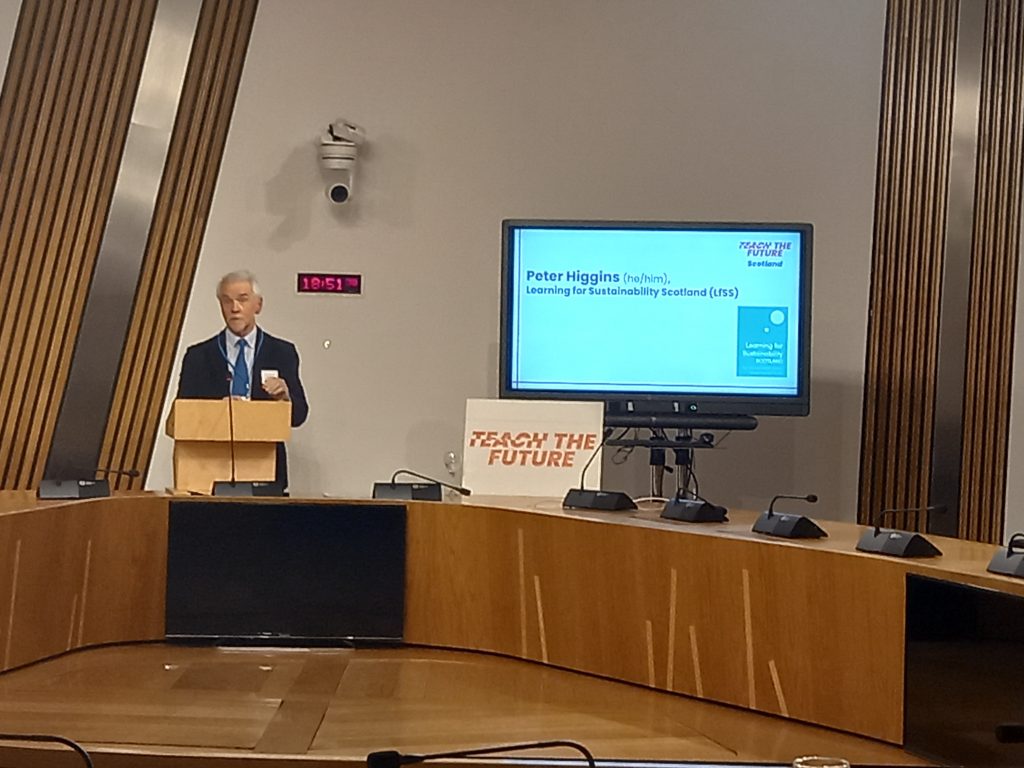The role of education in a climate emergency: four key asks from Teach the Future Scotland
Taking action on climate change is one of the major challenges of our times, and education has a major role to play.
On Wednesday 22 March we were please to attend student-led campaign, Teach the Future Scotland‘s reception at the Scottish Parliament, where they presented four key asks to a diverse audience of MSPs, young people, educators, NGOs and other stakeholders from across the education and climate action movements.
The four asks are:
- Ask 1: Mainstream inclusion of climate justice education across the curriculum.
- Ask 2: Inclusion of the climate emergency and ecological crisis in teacher education and a new professional teaching qualification.
- Ask 3: Increased priority for sustainability in school inspections.
- Ask 4: Educational buildings put at the front of the queue to be retrofitted to net-zero standards.

Sponsored by Ross Greer, MSP, the reception heard from a range of supporters; including former Cabinet Secretary for Education and Skills, Shirley-Anne Somerville; and the Director of Learning for Sustainability Scotland, Professor Pete Higgins.
Below is a summary of some of the key points shared by those invited to speak and you can read more on Teach the Future’s website.
- “Scotland has big ideas and ambition… and was the first nation to deliver Learning for Sustainability (LfS) and to sign up to it being an entitlement for all learners. We need to make sure that the LfS entitlement experience is consistent across all schools and communities. Sustainability is a key aspect of educational reform as identified by the Muir report, which we are committed to achieving” Shirley-Anne Somerville, former Cabinet Secretary for Education & Skills
- “We don’t simply want youth to know the realities of the climate emergency. We want them to develop skills and knowledge to address it… in a just way; making sure everyone has the same opportunities.” Ross Greer, MSP
- “This isn’t just about content – this is an approach, a way of being and thinking, critically thinking, living our values, having the skills to act sustainably. If you don’t teach for sustainability, you implicitly teach unsustainability.” Professor Pete Higgins, University of Edinburgh and Learning for Sustainability Scotland
- “Education is a fundamental right but we’ve got a lot of work to do in Scotland for our systems to reflect that.” Ellie Gomersall, NUS Scotland
- “There’s a whole cohort of students who leave high school with next to no education on climate change or sustainability… It’s not yet embedded in the curriculum in the way that it needs to be.” Alex Carter Falkirk High School.
- “I haven’t had the chance to learn about climate change since I dropped geography in S2.” Lily Henderson, Fridays For Future International.
‘Learner voice’ in a time of change
These Asks come at a time of major education reform in Scotland: including the imminent publication of the refreshed National Action Plan for Learning for Sustainability – as well as significant changes in Scotland’s political leadership. ‘Learner voice’ is a core element of these educational reforms and it will be of great interest to many to see the ways in which the asks of these young people are heard and acted upon.


